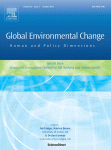Human mobility intentions in response to heat in urban South East Asia
Zander, Kerstin K. / Carmen Richerzhagen / Stephen T. Garnett
Externe Publikationen
(2019)
in: Global Environmental Change 56 (May), 18-28
DOI: https://doi.org/10.1016/j.gloenvcha.2019.03.004
Information
Climate change and associated weather extremes and natural hazards have large impacts on the urban population of the Global South where population growth will rapidly increase the already large number of people who will be affected. Using Protection Motivation Theory (PMT), we investigate how hot temperatures, manifested as heat stress, is affecting the intentions of moving among the urban population in three Asian countries (Indonesia, Malaysia, Philippines). We conducted an online survey with 2219 respondents. Almost all respondents (98%) had experienced heat stress, albeit at different levels. When asked whether respondents would be likely to move away from their current locations because of heat, nearly a quarter (23%) reported that they were very likely to do so, and 50% that they probably would. Stronger moving intentions because of heat were associated with women and older people. Concerns about increases from damage from heat (threat appraisal) were more strongly associated with moving intentions than an understanding of the costs and benefits (coping appraisal). Among the threat appraisal, heat stress levels and risk perception were the strongest predictors of moving intentions because of heat. The results contrast with the findings of migration studies in response to sudden onset hazards and underpin the differences in adaptation behaviour in response to different climate change impacts. Moving away to cooler places as an adaptation strategy to heat may be challenging to foresee in terms of timing, capabilities, destination and potential costs because it may not happen soon. We strongly recommend further research on climate change migration of the urban population, including within urban and urban-to-urban movements. While many people move back after sudden onset disasters, heat potentially leads to permanent movements given it is likely to be better planned, and as the habitability of some places is increasingly compromised. Overall the effects of slow onset environmental hazards such as pollution and heat on migration warrant more research attention given the rapidity of urban population growth, particularly in the global south.
Weitere IDOS-Expert*innen zu diesem Thema
-
Abedtalas, Musallam
Ökonomie
-
Aleksandrova, Mariya
Climate risk governance
-
Brandi, Clara
Ökonomie und Politikwissenschaft
-
Christ, Simone
Sozialanthropologie
-
Dippel, Beatrice
Komparatistik
-
Donnelly, Aiveen
Politikwissenschaft
-
Ekoh, Susan S.
Umweltwissenschaft
-
Flaig, Merlin
Sozialwissenschaft
-
Fuhrmann-Riebel, Hanna
Ökonomie
-
Goedeking, Nicholas
Vergleichende politische Ökonomie
-
Hagenström, Paul
Internationale Beziehungen
-
Jaji, Rose
Anthropologie
-
Kativu, Saymore Ngonidzashe
Geographie
-
Kuhnt, Jana
Entwicklungsökonomin
-
Lehmann, Ina
Politikwissenschaft
-
Malerba, Daniele
Ökonomie
-
Martin-Shields, Charles
Politikwissenschaftler
-
Mathis, Okka Lou
Politikwissenschaftlerin
-
Never, Babette
Politikwissenschaftlerin
-
Pegels, Anna
Ökonomin
-
Putz, Lena-Marie
Friedens- und Konfliktforschung
-
Rodríguez de Francisco, Jean Carlo
Ökologische Ökonomie
-
Srigiri, Srinivasa Reddy
Agrarökonom
-
Wagner, Niklas
Klima- und Wissenssoziologie
-
Yi, HyunAh
Energie- und Umweltwissenschaften

